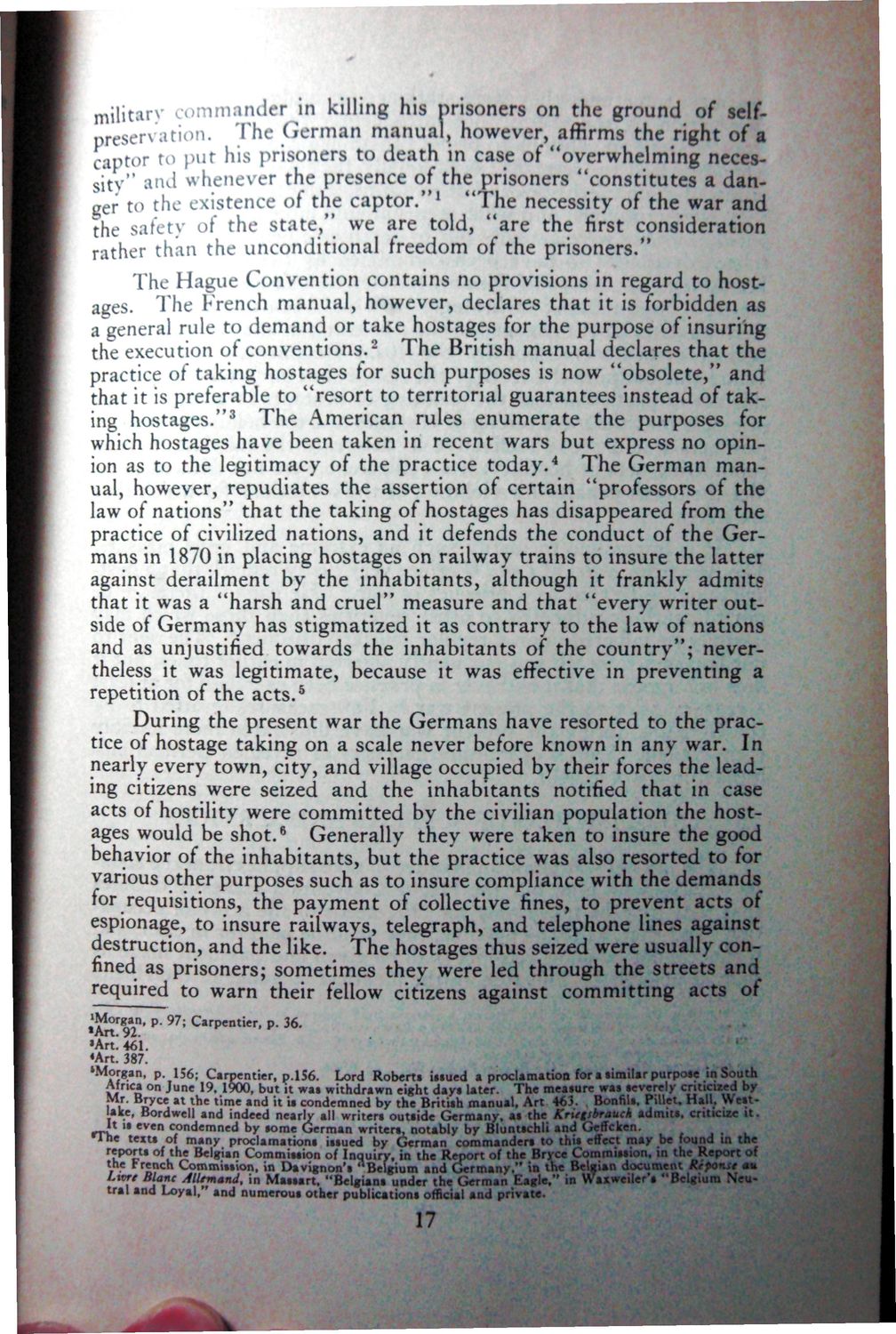| |
| |
Caption: War Publications - WWI Compilation 1923 - Article 14
This is a reduced-resolution page image for fast online browsing.

EXTRACTED TEXT FROM PAGE:
military commander in killing his prisoners on the ground of selfpreservation. The German manual, however, affirms the right of a captor u put his prisoners to death in case of "overwhelming necessity" and whenever the presence of the prisoners "constitutes a dan1 ger to the existence of the captor." "The necessity of the war and the safety of the state/' we are told, "are the first consideration rather than the unconditional freedom of the prisoners." The Hague Convention contains no provisions in regard to hostages. The French manual, however, declares that it is forbidden as a general rule to demand or take hostages for the purpose of insuring 2 the execution of conventions. The British manual declares that the practice of taking hostages for such purposes is now "obsolete," and that it is preferable to "resort to territorial guarantees instead of tak3 ing hostages." The American rules enumerate the purposes for which hostages have been taken in recent wars but express no opin4 ion as to the legitimacy of the practice today. The German manual, however, repudiates the assertion of certain "professors of the law of nations" that the taking of hostages has disappeared from the practice of civilized nations, and it defends the conduct of the Germans in 1870 in placing hostages on railway trains to insure the latter against derailment by the inhabitants, although it frankly admits that it was a "harsh and cruel" measure and that "every writer outside of Germany has stigmatized it as contrary to the law of nations and as unjustified towards the inhabitants of the country"; nevertheless it was legitimate, because it was effective in preventing a 5 repetition of the acts. During the present war the Germans have resorted to the practice of hostage taking on a scale never before known in any war. In nearly every town, city, and village occupied by their forces the leading citizens were seized and the inhabitants notified that in case acts of hostility were committed by the civilian population the host6 ages would be shot. Generally they were taken to insure the good behavior of the inhabitants, but the practice was also resorted to for various other purposes such as to insure compliance with the demands for requisitions, the payment of collective fines, to prevent acts of espionage, to insure railways, telegraph, and telephone lines against destruction, and the like. The hostages thus seized were usually confined as prisoners; sometimes they were led through the streets and required to warn their fellow citizens against committing acts of 'Morgan, p. 97; Carpentier, p. 36. 'Art. 92•Art. 461. •Art. 387. •Morgan, p. 156; Carpcntier, p. 156. Lord Robert! issued a proclamation for a similar purpose in South Africa onatJuneh 19,i m c a n d U it was withdrawn eight days later. The measure was severely criticized by 1900, but ce t c t i I' ^ i » condemned by the British manual, Art 463. Bonfils, Pillet. Hall. Westlake, Bordwell and indeed nearly all writers outside Germany, as the Krifgsbrauch admits, criticize it, It is even condemned by some German writers, notably by Bluntschli and GerTcken. Inc texts of many proclamations issued by German commanders to this effect may be found in the reports n c nthe Belgian Commission of Inquiry, in the Report of the Bryce Commission, in the Report of of t • Fr£ Commission, in Davignon's ''Belgium and A r m i n v . " in the Belaian document Rrponse au L%vre Blanc MUmtnd, in Massart, "Belgians under the tral and Loyal, and numerous other publications oflfici 17
| |